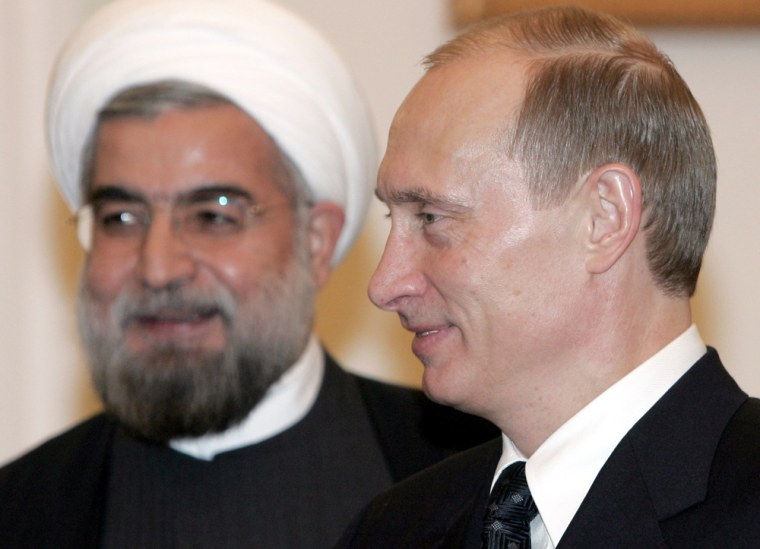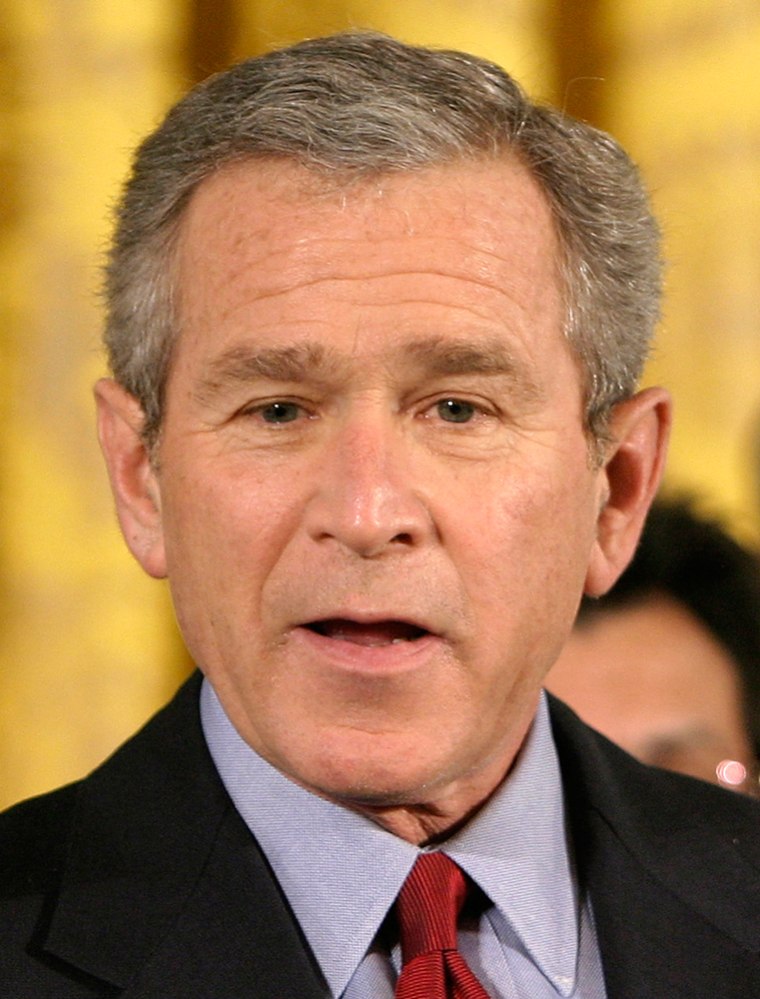President Bush said Friday that Iran is trying to use the United States’ refusal to join European talks over Tehran’s nuclear program as an excuse for not giving up uranium enrichment.
In interviews on the eve of a trip by the president to Europe, Bush stressed that the United States preferred diplomacy and did not want to use military action against Iran over the nuclear question.
“What they’re trying to do is kind of wiggle out. They’re trying to say, ‘Well, we won’t do anything because America is not involved.’ Well, America is involved. We’re in close consultation with our friends,” Bush said.
He was speaking to Germany’s ARD television, one of a series of interviews he gave Friday prior to a trip to Belgium, Germany and Slovakia next week.
The European Union, represented by France, Britain and Germany, has been trying to persuade Iran to scrap any nuclear weapons-related activities in return for economic incentives.
The United States has rejected European calls for the Bush administration to bolster the EU’s leverage by getting involved in the bargaining and offering incentives of its own for Iran to end uranium enrichment activities.
Washington wants Iran to give up its nuclear weapons ambitions — which Tehran denies having — and comply with International Atomic Energy Agency obligations, stop support for terrorism and allow democratic reforms.
In the ARD interview, Bush insisted that he wants a peaceful, diplomatic solution to the problem and said any talk of a military attack is “just not the truth.”
“We want diplomacy to work, and I believe diplomacy can work so long as the Iranians don’t divide Europe and the United States. And the common goal is for them not to have a nuclear weapon,” Bush told Belgium’s VRT television channel.
'Never ... say never'
“First of all you never want a president to say never, but military action is certainly not, is never the president’s first choice,” Bush said, when asked if he could rule out military action against Iran.
“Diplomacy is always the president’s, or at least always my first choice and we’ve got a common goal, and that is that Iran should not have a nuclear weapon,” he said in the interview taped in Washington and broadcast before his arrival in Brussels Sunday for summits with NATO and the EU.
Bush suggested there was no divergence between the policy of Washington and Europe on Iran and said they could succeed together in ensuring that Iran did not develop an atom bomb.
“We’ve got a common goal and that is that Iran should not have a nuclear weapon ... I think if we continue to speak with one voice and not let them split us up and keep the pressure on, we can achieve the objective,” he said.
“I’m convinced again that if the Iranians hear us loud and clear and without any wavering, that they will make the rational decision,” Bush said in an interview with France 3 television.
Israel said Wednesday that Iran was just six months away from having the knowledge to build nuclear weapons.
European leaders are hoping to convince Bush to take a bigger role in the negotiations with Iran. Former Irish Prime Minister John Bruton, the European Commission’s ambassador to the United States, said this week the leaders’ goal is “getting the United States involved in a more committed way” in their talks with Iran.
Bush is expected to use his trip to try to soothe ruffled feathers after a first term in which he has been criticized in Europe for riding rough-shod over the views of European leaders, particularly France’s President Jacques Chirac.
Russia proceeds with aid for Iran reactor
His comments came amid debate over Iran's nuclear intentions. Russian President Vladimir Putin said Friday that he is convinced Iran does not intend to develop nuclear weapons and said he plans to visit the nation.

Putin, at a meeting with Iranian National Security Council chief Hasan Rohani, also said Russia would continue its nuclear cooperation with Iran. Moscow has helped Iran build a nuclear reactor, a project that has been heavily criticized by the United States which fears it could be used to help Tehran develop nuclear weapons.
"The latest steps from Iran confirm that Iran does not intend to produce nuclear weapons and we will continue to develop relations in all spheres, including the peaceful use of nuclear energy," Putin said.
"We hope that Iran will strictly adhere to all international agreements, in relation to Russia and the international community," he said, adding that he had accepted an invitation by Iran's leadership for him to visit the country.
Russia's nuclear chief is expected in Iran next week to sign a protocol on returning spent nuclear fuel to Russia, the only remaining obstacle to the launch of the Russian-built reactor. If the signing goes ahead as planned on Feb. 26, it would pave the way for the deliveries of Russian nuclear fuel for the Bushehr reactor, which is set to begin operating in early 2006.
The protocol is aimed at reducing concerns that Iran could reprocess spent nuclear fuel from the $800 million Bushehr reactor to extract plutonium, which could be used in nuclear weapons. Moscow says that having Iran ship spent nuclear fuel back to Russia, along with international monitoring, will make any such project impossible.
